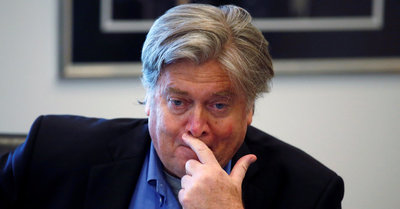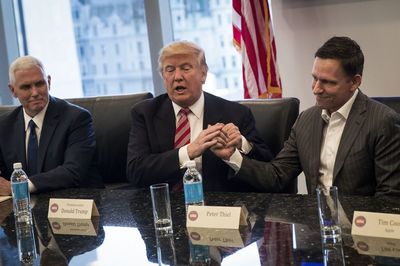|
Will creative destruction be America’s future ?
One of my good friends here is a true old style American liberal. Crossed the border into Canada as a result of his disgust over Vietnam in the sixties, became a professor and now an angel investor and avid student of history. But a liberal, above all. We get together often to talk business and politics, so not long after the election of Trump I reached out, preparing myself for a somewhat emotional lecture of how devastated he was about it all. Yet his reaction was as calm and measured as it was baffling to me. ‘No’, he said in a resigned manner, ‘this was bound to happen, if something is not working Americans will try the next best option and it is as simple as that’. ‘But’, he added, ‘progressivism as we know it is dead in America, that’s for sure’. No anger, no frustration, just a simple statement underlining how Americans pragmatically tweak and change things as they see fit. It was a sobering but above all realistic call of what had just transpired. His words lingered in the air in the subsequent weeks as I tried to unwind the new balance of power, figuring out how things would be managed from Washington going forward. The name that kept popping up was that of Steve Bannon, CEO of Breitbart Media and Trump’s campaign manager. Having met Andrew Breitbart many years ago when he was only known as ‘Drudge’s Westcoast guy’ I was quite familiar with the brand and the general political direction of the media outlet Bannon invested in and now managed. It has to be said though that when Breitbart passed away there was praise for him from all sides of the political spectrum, a sentiment that was hard to find now that his successor was ensconced in the White House. But what was Bannon really about, what were his objectives? The superficial slurs of ‘white supremacist’ seemed too banal and uninformed, there had to be some deeper grounds on which Bannon made his career as an activist and that landed him only steps away from the presidency. Once I had digested some readily available articles about him, most quite overlapping in terms of information, I watched ‘Generation Zero’ a documentary Bannon released in 2010 and which supposedly lays out his vision for America. It is a somewhat dark and haunting epic centered around the financial crisis of 2008, its origins and its key perpetrators, at least according to Bannon: the baby boomer generation. To put it in simple terms, he sees four turning points in American history, each an economic crisis that mutates into an all out war that unites the nation and in turn resets American life to a new start. The American Revolution, The Civil War and the Second World War were the first three, the recent financial crisis of 2008 is a prelude to the fourth turning point that – as it happens – we are now entering into. The movie itself does not point to the imminent war, but based on Bannon’s comments it is likely an ever-expanding conflict with radical Islam, or could it be China? These are of course entirely plausible theories of history and Bannon fills the documentary with evidence of it all, but noticeably points to the liberal baby boomer generation – of which he is a part – as the inadvertent architects of the fourth turn. The economic argument he puts forward could equally have been made by Bernie Sanders: government bails out Wall Street and the average citizen foots the bill. A bill that is now so high that we are passing on an amount of debt that will likely crush and frustrate the next generation’s prospects of having a chance at a life that would resemble that of previous generations. Bannon takes the gloomier road and points to the baby boomer’s hedonism and self-indulgence as the dark force that has wrecked America for many decades to come. In it, he makes no distinction between the three boomer leaders that presided over the steady rot that has infected the system: Clinton, Bush and Obama. Elitism trumps ideology. Throughout Trump’s campaign there was a call to go back to the 1950s, a time when ‘America was great’, productive and growing. I have seen similar nostalgic calls for that period in my native Netherlands when the late Pim Fortuyn took the stage as right-of-centre populist, when the post-war years were heralded as a model to aspire to. No one has ever made clear why, my father always said the fifties were an incredibly and forgettable boring period, but Bannon succeeds in explaining the why. No one, he argues, after having gone through the Great Depression and World War II was interested in anything but a ‘white picket fences’ happy suburbia where everyone worked, played and was content. This also explains why we can no longer replicate this utopia: none of us have gone through a real depression and devastating war, so none of the baby boomer or millennial generations can actually value, much less aspire to that what is so special about this sub-urban dreamland. If anything, it has made most people deeply unhappy and often in search of a ‘meaning of life’ quest. If Bannon’s views come to fruition there will be plenty of meaning to be found in merely surviving and fighting whoever takes on what is left of the western world. As I said: gloom and a prelude to a civilizational war is what ‘Generation Zero’ is all about. Bannon seeks the creative destruction of this deformed society that we now live in, a society where risk taking, the core American value, has been taken away either directly or by government guarantee. In that he parts ways with Sanders who would use the state as a force of good, Bannon wants to tear the state apart. The carmaker bail-out is a great example and that brings us to that other creative destructionist supporting Trump, Silicon Valley entrepreneur Peter Thiel. Few understood how a gay tech entrepreneur could back up Trump. Based on what we know about him is that he saw in Trump exactly the same thing Bannon noticed: the agent that could bring about a radical reset of how we run the economy, how we manage America. As a so-called ‘techno-libertarian’ Thiel would no doubt have rejected the now infamous auto industry bail-out, not only because of its poor economics (which would have been Bannon’s point) but also for the fact that ‘the car’ was already being re-engineered by different companies in a different place. Why bail-out ‘big auto’ when Google is already on its way building tomorrow’s car? Thiel believes strongly that America lost its way because it stopped innovating at the pace it once did and only a radical overhaul of existing industries can open the way to a new America. Herein lies of course a conflict with the new president whose promise to ‘bring back’ manufacturing jobs contrasts sharply with the idea of ‘reinventing’ manufacturing jobs. If he is to take Thiel’s – and Bannon’s advice – the actual destruction of old industries would set the stage for very different jobs. So, Bannon and Thiel unleashed a quest for a new America and settled – for the time being – on Trump to bring in that agenda. And while the entire world is fretting over immigration and the president’s daily tweets, the far more powerful move into the future is beginning to shape up. It is one that is inspired by both Bannon and Thiel and will very likely end or reform liberal society to a point that we find it hard to recognize it, quite possibly unleashing an unregulated and extreme form of free-market enterprise. Because that is what America is best at and reversing laws like Frank-Dodd will unleash another Wall Street bonanza, this time however there will not be a government to bail out the losers. The deeper question is if Bannon and Thiel will be able to influence Trump to bring about their vision for a renewed America and what geopolitical gambles will be part of that package. West Wing access is a fluid thing even for these two. In case their tenure or Trump’s comes to an end the question will be who will work with what has been put in place because as my good liberal friend alluded to, it is unlikely that we will ever be turning back. The early stage of the Bannon-Thiel fueled revolution is an answer to the wave of irreversible technological, global and fiscal realities. We will all have to deal and work with it.
1 Comment
|
Archives
April 2020
Categories
All
|



 RSS Feed
RSS Feed